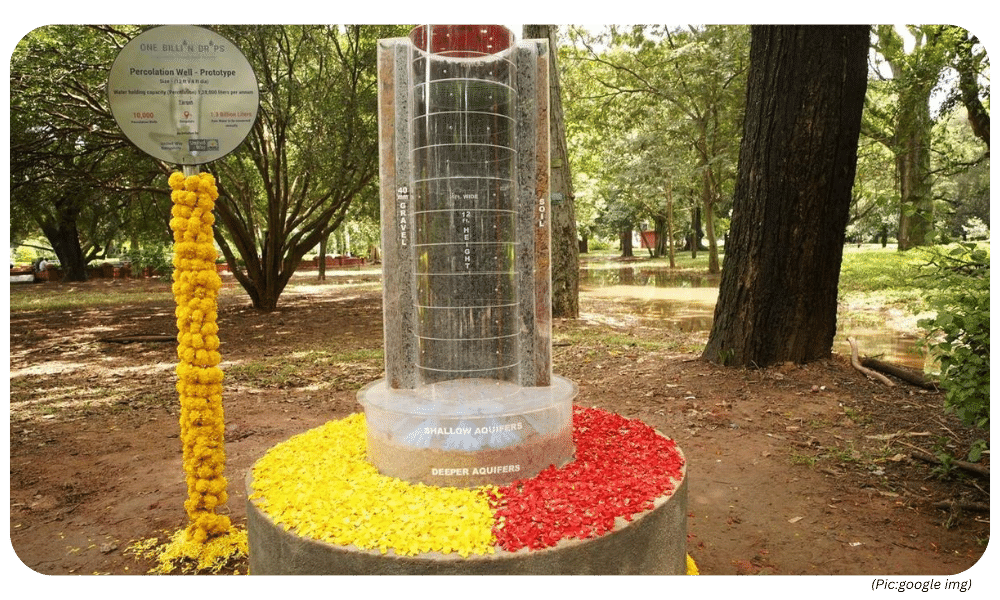Summary:
-
- Water Shortage: Bengaluru is facing a severe water shortage due to overexploitation of groundwater and inadequate rainwater harvesting.
-
- Percolation Wells: These cylindrical pits allow rainwater to percolate into the ground, replenishing groundwater aquifers.
-
- Community Efforts: Government, NGOs, and corporations are promoting percolation well construction for sustainable water management.
What is the news?
-
- Bengaluru, once known as the “Garden City,” is facing a severe water crisis. Dwindling groundwater levels threaten the city’s future. However, a traditional technique – percolation wells – offers a glimmer of hope.
The Challenge: A Disappearing Resource
-
- The rapid urbanization of Bengaluru has put immense pressure on its water resources. Overexploitation of groundwater and inadequate rainwater harvesting have led to a significant decline in water tables. This poses a serious threat to the city’s water security.
The Answer Lies Beneath: Percolation Wells
-
- Percolation wells are simple yet effective structures. These are essentially cylindrical pits, lined with concrete or brick, that allow rainwater to percolate into the ground. This replenishes the depleted groundwater aquifers, providing a natural and sustainable source of water.

The benefits of these wells are numerous:
-
- Rainwater Harvesting: They capture rainwater, a valuable resource that often goes to waste.
- Groundwater Recharge: By allowing water to percolate, they replenish underground water reserves.
- Cost-Effective Solution: Percolation wells are relatively inexpensive to construct and maintain.
- Low Maintenance: Once built, they require minimal maintenance, making them a sustainable solution.
Revival of an Old Technique
- The concept of percolation wells is not new. Traditionally, they were a common feature in Indian landscapes. However, with modernization, their use declined. Now, with the water crisis looming, cities like Bengaluru are rediscovering their potential.
Several initiatives are underway to promote percolation wells in Bengaluru:
-
- Government Initiatives: The government is promoting the construction of percolation wells in residential and public areas.
- Community Efforts: NGOs and citizen groups are encouraging residents to build these wells in their own homes.
- Corporate Responsibility: Some companies are integrating percolation wells into their infrastructure projects.
A Step Towards a Sustainable Future
-
- Percolation wells cannot be the sole solution to Bengaluru’s water woes. However, they represent a significant step towards a more sustainable water management plan. By combining traditional wisdom with modern technology, cities like Bengaluru can secure their water future.
Here’s what needs to be done:
-
- Widespread Adoption: Efforts are needed to encourage the construction of percolation wells across the city, in both private and public spaces.
- Public Awareness: Raising public awareness about the importance of rainwater harvesting and water conservation is crucial.
- Maintenance and Monitoring: Regular maintenance and monitoring of existing percolation wells is essential to ensure their functionality.
By embracing this simple yet effective solution, Bengaluru can move towards a future where water scarcity becomes a distant memory. The city that gave us the “Garden City” moniker can once again become a model for sustainable water management.
QuizTime:
Mains Questions:

Question 1:
Bengaluru, once known as the “Garden City,” is facing a severe water crisis. Discuss the factors contributing to this crisis and analyze the potential of percolation wells as a solution. What other measures can be adopted for sustainable water management in the city? (250 words)
Model Answer:
Factors Contributing to Water Crisis:
-
- Overexploitation of Groundwater: Uncontrolled extraction of groundwater for domestic and industrial uses has depleted Bengaluru’s aquifers.
- Urbanization: Rapid urban expansion has increased impervious surfaces, reducing rainwater infiltration and groundwater recharge.
- Climate Change: Changes in rainfall patterns, with erratic rainfall and longer dry spells, can exacerbate water scarcity.
Percolation Wells as a Solution:
-
- Rainwater Harvesting: Percolation wells capture rainwater, a valuable resource that often goes to waste.
- Groundwater Recharge: By allowing rainwater to percolate, they replenish underground water reserves, providing a sustainable water source.
- Cost-Effective and Low Maintenance: These wells are relatively inexpensive to construct and maintain.
Other Sustainable Measures:
-
- Public Awareness Campaigns: Educating citizens on water conservation practices like rainwater harvesting and responsible water usage.
- Regulation of Water Usage: Implementing stricter regulations on water extraction, especially for industries.
- Leakage Detection and Repair: Fixing leaky pipes and infrastructure to minimize water wastage.
- Water-Efficient Technologies: Promoting the use of water-efficient appliances and irrigation methods.
Question 2:
Discuss the revival of traditional water management techniques like percolation wells. In what ways can these techniques be integrated with modern technologies for a more sustainable water management approach in Indian cities? (250 words)
Model Answer:
Revival of Traditional Techniques:
-
- Percolation Wells: These simple yet effective structures are being rediscovered as a solution to water scarcity.
- Stepwells and Tanks: Traditional water storage structures can be revived and integrated into urban planning.
- Indigenous Knowledge Systems: Local knowledge about water conservation practices can be valuable for sustainable management.
Integration with Modern Technologies:
-
- Sensor-based Monitoring: Sensors can be used to monitor water levels in wells and optimize water usage.
- Smart Irrigation Systems: Modern irrigation technologies can improve water efficiency in agriculture.
- Data Analytics: Data analysis can help predict water demand and optimize resource allocation.
Benefits of Integration:
-
- Improved Efficiency: Modern technology can enhance the effectiveness of traditional techniques.
- Scalability: Technological advancements can help scale up traditional solutions for larger urban areas.
- Sustainability: Combining traditional wisdom with modern tools fosters a sustainable water management approach.
Remember: These are just sample answers. It’s important to further research and refine your responses based on your own understanding and perspective. Read entire UPSC Current Affairs.
Relevance to the UPSC Prelims and Mains syllabus under the following topics:

Prelims:
-
- General Studies Paper I (CSAT): A case study or comprehension passage in the CSAT paper could potentially use Bengaluru’s water crisis as a scenario to test analytical abilities. Here, candidates would need to identify the causes, analyze potential solutions like percolation wells, and assess their effectiveness.
Mains:
-
- General Studies Paper II (Governance): The topic can be discussed within the broader theme of urban water management challenges and sustainable practices. Here, candidates could analyze Bengaluru’s case, discuss the role of percolation wells, and suggest policy measures for their promotion.
- General Studies Paper III (Indian Economy): While not directly related to core economic concepts, the water crisis could be mentioned in discussions about urban infrastructure challenges and their impact on economic activity in cities like Bengaluru.
- General Studies Paper IV (Ethics, Integrity, and Aptitude): The topic can be linked to the ethical use of water resources and citizen responsibility for water conservation. Here, candidates could discuss the importance of promoting public awareness campaigns and community participation in initiatives like building percolation wells.











0 Comments